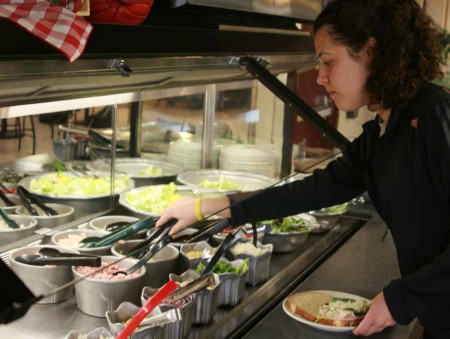
When students come to college it gives them more freedom and it can affect their overall health. With late night study sessions fueled by pizza and chocolate, and the lack of exercise, students may have a hard time maintaining a healthy lifestyle. Avoiding the freshman 15 can seem next to impossible; however, it is all about self-discipline and healthy choices.
Starting your college career off on the right foot can really help maintain a healthy lifestyle. It may be harder to make these healthier choices with a busy schedule, having more freedom than you would living at home, or even just the temptation of all the desserts and fatty foods available.
It’s often times harder for student living in residence halls, because they don’t necessarily have the freedom to cook meals using an oven or stove, whereas students living off campus have more choices. “I started eating a lot healthier when I lived off campus,” said sophomore Tara Dykehouse.
“I had a lot more options at the cafeterias.”
It’s all about what you choose to eat. There are always snacks and junk foods, but there are many healthy alternatives offered at the dining halls on campus.
Eating healthy isn’t always easy, or appetizing, in the dining halls. While you can’t always have a homemade meal, some rely fully on cafeteria food and snacks.
“I was always used to having dinner made by my mom every night,” said freshman Brittany Wood. “However, when I came to college I found myself eating more chips or candy in between classes or even as a meal.”
The college diet of most college students consists of cereal, chips, and microwavable foods. It’s important to do the best to eat a healthy, well-balanced diet and your body will thank you for it. In addition to keeping pounds off, you will feel better and have more energy if you eat plenty of fruits and vegetables, lean meats, and minimize the sugar and fat.

On the Ferris website in the dining section you can see the nutrition information of everything on the menu served each day. It is a good idea to be able to know what is in the foods you are putting into your mouth.
“Every day before I go to the Rock I look up what they are serving and figure out how many calories and fats are in the foods,” said freshman Bethany Sonefeld. “This is how I choose what I am going to eat that night. I like knowing the nutrition of each meal I eat.”
There are also lists of healthy tips and hints that you can follow on the website. The foods served shouldn’t be the problem, but it is the decision of what types of foods you are eating that matter. Research supports the fact that we can live better by exercising, maintaining a healthy weight, eating a variety of foods, and reducing our consumption of fried and fat foods, as well as salt.
A few questions to ask yourself to see if you are making healthy decisions are: “Do you frequently choose fried foods?” “Does your plate always have butter on it?” “Do you usually drink pop or punch instead of milk, water, or juice?” A few things to keep in mind are not always going up for seconds, switching that glass of pop for a glass of water, limiting the amounts of dressing or sauce on a salad or sandwich, or not having a cookie or piece of pie for dessert. Eating unnecessary calories can be a problem.
Staying healthy in college takes nothing more than self- discipline. College life can be tough, stressful and overwhelming at times. It is very important that college students lead a well-balanced life at college, which includes college health. Your health is one of the most important things to think about, so it’s very crucial to always keep in mind what’s best for you in the long run. Staying healthy at college is important because it helps students feel better and more confident.
